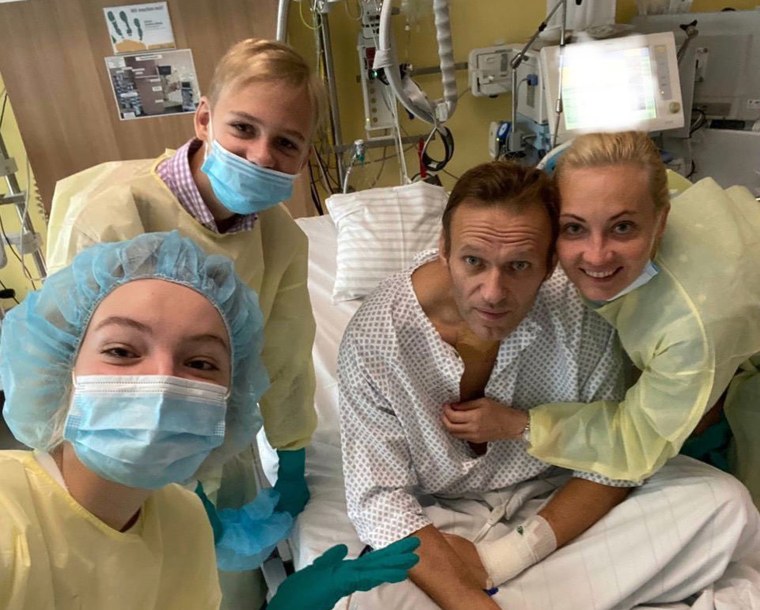Russian opposition leader Alexei Navalny on Tuesday released in his first photo since being poisoned last month, looking gaunt but alert from his hospital bed in Berlin.
Navalny posed with his wife, Yulia, and two children, who were wearing masks and hospital gowns.

“I still can’t do many things, but yesterday I could breathe by myself the whole day,” Navalny said in the Instagram post, which has been "liked" by more than 500,000 people. “I did not use any outside help, not even the simplest valve in my throat.”
“I liked it a lot,” he quipped, adding that he “misses everyone.”
Navalny, 44, a foe of Russian President Vladimir Putin's, fell ill on a flight from Tomsk, a Siberian city where he and his team were conducting a corruption investigation, to Moscow on Aug. 20.
The plane was forced to make an emergency landing, and Navalny was hospitalized and put in an induced coma and on a ventilator. Doctors in Russia speculated that he may have suffered from a metabolic disease.
On the insistence of his family, Navalny was later flown to Berlin, where the German government said he had been poisoned by a military-grade nerve agent similar to the one the British government said was used to poison former Russian spy Sergei Skripal and his daughter Yulia in the U.K. in 2018.
A German government spokesman, Steffen Seibert, said Monday that the initial findings had now been independently corroborated by laboratories in France and Sweden.
German Chancellor Angela Merkel called the findings “disturbing” and demanded that the Russian government explain the use of the nerve agent, raising international pressure on Moscow and further straining its already frail relationship with the West.
The Kremlin has said they have not seen the results of the German investigation and insisted there is no definitive proof that Navalny was poisoned.
Download the NBC News app for breaking news and politics
In Russia, the ruling United Russia party suffered setbacks in votes for two Siberian City Councils contested by supporters of Navalny despite securing landslide wins elsewhere at weekend regional elections.
Navalny had promoted a tactical voting strategy to challenge United Russia and disrupt a political system in which outspoken Kremlin critics are often barred from competing. His allies have pressed ahead with the strategy despite his illness.
Navalny rose to prominence in 2009 with investigations into official corruption and became a protest leader when hundreds of thousands took to the streets across Russia in 2011 to protest electoral fraud.
A few years later, and after several short-term spells in jail, Navalny faced two separate sets of fraud charges, which were viewed as political retribution aimed at stopping him from running for office.
Navalny’s anti-corruption foundation has conducted in-depth investigations into the highest ranks of the Russian political elite, including his most famous investigation into former Prime Minister and President Dmitry Medvedev.
